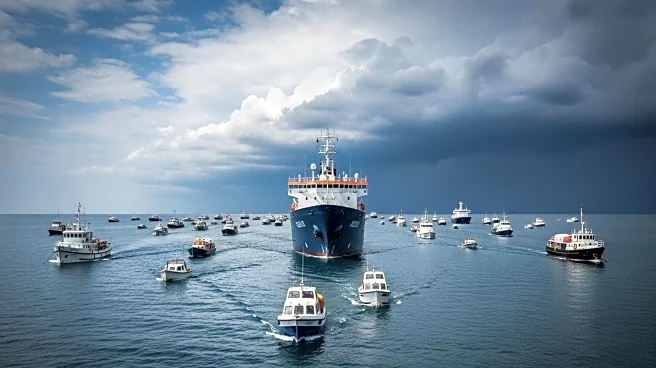What is the story about?
What's Happening?
The Global Sumud Flotilla, a coalition of approximately 50 civilian boats, set sail from Barcelona, Spain, in August, aiming to deliver food and medical supplies to Gaza. The flotilla's mission is to challenge Israel's blockade of Gaza, which activists claim is exacerbating the humanitarian crisis in the region. Recently, a single boat from the flotilla reportedly entered Gaza's waters, while others were intercepted by the Israeli military. Videos shared by activists show Israeli forces intercepting the boats and detaining passengers, including notable activist Greta Thunberg. The Israeli Foreign Ministry confirmed that detained activists are being taken to Israel for deportation. Israel accuses the flotilla of provocation, asserting that aid can be delivered through Israeli ports under inspection.
Why It's Important?
The interception of the Global Sumud Flotilla highlights the ongoing tensions surrounding humanitarian aid to Gaza. The situation underscores the complex geopolitical dynamics in the region, with Israel maintaining a blockade it argues is necessary for security, while activists and some international observers view it as a humanitarian issue. The incident has sparked global protests and diplomatic reactions, including Colombia's decision to expel Israeli diplomats and Spain's efforts to protect its citizens involved in the flotilla. The broader implications involve international law and the rights of states versus humanitarian needs, with potential impacts on international relations and policy regarding the Israeli-Palestinian conflict.
What's Next?
Israel has announced plans to deport the detained activists to Europe. The international community may continue to respond, with potential diplomatic repercussions and increased advocacy for humanitarian access to Gaza. The situation could lead to further protests and calls for policy changes regarding the blockade and humanitarian aid delivery. Stakeholders, including governments and international organizations, may need to navigate the delicate balance between security concerns and humanitarian obligations.
Beyond the Headlines
The interception of the flotilla raises ethical questions about the use of blockades in conflict zones and the responsibilities of the international community to ensure humanitarian access. The incident may influence future humanitarian missions and the strategies employed by activists to draw attention to crises. It also highlights the role of media and public opinion in shaping international responses to complex geopolitical issues.

















